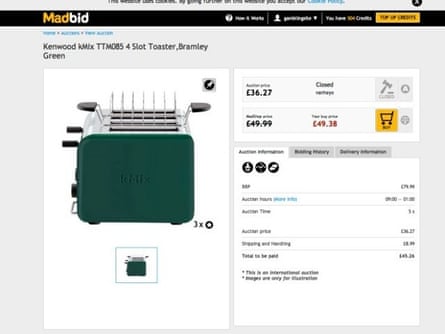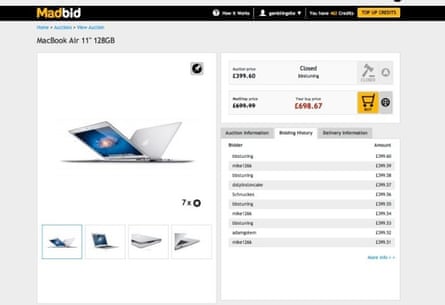The home page of auction website MadBid makes a series of stunning claims. One bidder snapped up a Fiat 500 for just £193. Another grabbed “a week in the sun” for a mere £3.28. A third is about to take delivery of a brand-new Mini One for the staggeringly low price of £6.83.
But a Guardian Money investigation suggests that successful buyers may end up paying more for goods available on conventional retail sites, while the far more numerous unsuccessful bidders face losing £28 or more each.
We also found evidence to suggest that the company, ultimately based in the Channel Islands, is making extraordinary profits – potentially up to £14,000 on the sale of an Apple MacBook in one of its penny auctions. We also found pricing irregularities across the website, with “sold prices” incorrectly stated across its many international versions.
MadBid has enjoyed extraordinary growth, claiming to have produced 750,000 winners since launching in 2008. Buyers flocked to the site following an extensive TV advertising campaign, full-page adverts in free newspaper Metro, and glowing advertorials on the Daily Mirror and Daily Mail websites.
Set up by Finnish entrepreneur Juha Koski in London, MadBid has grown into a multimillion-pound business, with sales up a reported 71% in one year alone. It has expanded into Europe and north America, and has just started operations in its thirteenth country. But its meteoric growth has also left a trail of unhappy customers. In recent months MadBid – as judged by the number of letters sent to the Guardian – has become the Consumer Champions column’s most complained-about firm in Britain, beating any single individual bank or utility company.
Readers pay at least £27.99 to participate in the bids, but allege they are left unhappy – some having paid hundreds of pounds making unsuccessful bids; they say they have to sign up and buy credits to bid before they take part and begin to understand how the system works; some complain about “disappearing credits”; and others say obtaining refunds is virtually impossible.
Unlike conventional auction sites such as eBay, MadBid users have to pay for every bid they place, typically 15p-20p, depending on an item’s value. The auctions have no set finish time and rely on people continuing to bid. Each bid increases the item price by 1p. A timer counts down and if no one bids further before the clock stops, the item is sold to the last bidder at the closing price.
The Guardian paid to join MadBid, and the first item we bid on was a Kenwood toaster (see Putting it to the test). Eventually the item was sold for £36.27, plus £8.99 postage. MadBid said the item had an RRP of £79.99, yet the toaster is for sale on electricals website Hughes for £24.99 and on Amazon at £31.99 – both including delivery.
MadBid is fast moving and, some say, addictive – users hope that “one more bid” might win them an item, although the reality is somewhat different. When we bid on a MacBook Air, costing just over £600 on Amazon, it eventually sold for £399.60. But to buy it at that price the winner also had to pay to make multiple bids – we counted more than 1,200 in this case. If they were paying to bid in the same way that we were – 35p for each bid we made – that would have added around £420 to the “sold” price, making it much more expensive than buying on Amazon.
MadBid appears to make most of its money from failed bids. In total, it would have earned around £14,000 from bids on the MacBook if, like us, everyone was charged 35p each time they raised their bid by 1p.
MadBid denies that unsuccessful bidders lose their money. In a letter from its solicitors it said: “Bidders purchase credits and use these to bid. Unsuccessful bidders get the entire monetary value of their credits converted into ‘earned discount’ which can be used as an e-voucher to buy goods from our client’s online shop, at a competitive price. It therefore follows that unsuccessful bidders do not lose their money.”
But in numerous letters to Money, unsuccessful bidders claim that prices in the “MadShop” make the earned discount effectively worthless. For example, one complainant said: “Yes, it is true that if you bid on a item and do not win, you get most of your money back to spend on items on closed bids. But the items are overpriced, eg a George Foreman grill that you can buy on Amazon for £20 less. A digital camera you can buy on Amazon £200-£300 cheaper. I stated this to MadBid [and] received no reply.”
Sites such as MadBid have almost no regulatory supervision. The Gambling Commission and the Financial Conduct Authority both said it does not fall within their remit, although in 2014 the Advertising Standards Authority upheld two complaints against MadBid on the grounds of misleading advertising.
MadBid engaged accountant BDO to “provide reasonable assurance” about the claims it makes on its website. In its report, BDO said it randomly selected 60 auctions and compared the sold price with the RRP used by MadBid. “Our testing … confirmed the accuracy of the savings calculated by MadBid.” BDO added that it had been “provided with evidence to confirm” that MadBid delivered on 18 car and motorbike auctions.
We asked if we could speak to any of the winners of the cars featured in its advertising. A YouTube video of a recent winner, posted on 1 December 2014, shows Corinna from Germany collecting a Nissan Qashqai, for which she paid €4,625. Two weeks ago we asked if we could talk to Corinna – or, indeed, any of the other car winners, about their experience – but the company declined. It said that to do so would be a “flagrant breach of the Data Protection Act”.
We also asked if BDO had spoken to the winners of the cars. In a statement from its solicitors, MadBid said BDO inspected invoices, ensured funds were paid to the dealerships, and were able to marry up the name of the successful bidder with the vehicle. It added that BDO did not contact the bidders direct.
Putting it to the test
Kenwood toaster A fancy £80 Kenwood toaster for just a few pounds? When Guardian Money joined MadBid as a member, this was the first item we decided to bid on. But the “bargain” price quickly evaporated. We were soon outbid by “Vanheyo”, who eventually paid £45.26 (£36.27 plus a delivery fee) for the item.
But in reality, rather than bagging a good deal, if Vanheyo had simply gone to online electrical retailer Hughes, he or she could have bought the same model for £24.99 with free delivery. In effect, they paid 81% more than they needed to – and could also have avoided the hassle of having to join MadBid.
Strikingly, this is almost the opposite of MadBid’s claim that “you can save up to 89% with our offers”.

What’s more, Vanheyo did not just pay £45.26 to buy the toaster. Before bidding they would have had to buy credits. Each bid cost around 15p, and while we don’t know how many bids were made, it could easily have added up to another £5 or £10, making the total purchase particularly bad value.
One of the unusual features about how MadBid works is that, while members have to buy credits in order to bid, one credit does not equal one bid. When we joined, our £27.99 bought us 550 credits, which works out at 5.08p for each one. When we bid for the toaster, each bid cost us three credits – or 15.24p. Each 15p bid pushes up the price of the item in the auction by just 1p.
But members who want to bid on more fancy items use many more credits each time they bid. For example, bidders for a “home cinema bundle” with a recommended retail price of £3,269 had to use 12 credits for each 1p bid – which, in our case, would have put the cost of each bid at 61p.
As each bidder puts in a bid, MadBid earns revenue – and the winning bidder still has to pay the final auction price. We can’t be absolutely certain how much MadBid earns when it sells an item, but the Kenwood toaster example suggests it is extremely profitable.
The final £36.27 bid price means that the toaster would have had 3,627 bids of 1p. Each of those 1p bids cost around 5p, suggesting that MadBid took £184.25, plus the £36.27 final price. That makes a grand total of more than £220 for selling a toaster that costs £25 to buy online.
One caveat to these figures, though, is that bidders may have paid different amounts for their credits.
However, MadBid claims that everyone is a winner, because when a bidder spends their credits the same cost is deducted from the price of the same item in the “MadShop”.
In the example of the Kenwood toaster, MadBid said the RRP was £79.99, and the MadShop price was £49.99. After using some of our credits it reduced the price of the toaster in the MadShop to £49.38, plus delivery of £8.99, making a total of £58.37. But that is still 133% more expensive than the price at Hughes. We were left mystified as to how that made us a winner.
We also checked the “recently closed auctions” page on the MadBid website to see the toaster we bid on and the price it was finally sold for. Despite checking over several days, it did not appear.
MacBook Air Many of the most enticing items (initially, at least) advertised on MadBid are Apple products. The home page of its website shows a MacBook Air “sold for 28p” and an iPad Retina 64GB “sold for £38.81”. But when Guardian Money bid on a MacBook Air 11” 128GB we had a very different experience.
First, we had to pay 35.56p for each bid. Eventually, after many hours of bidding, the item went for £399.60 to “BBStunning”.

The price at Amazon, for the same item, is £612.38, so it looks like a good deal – although a discount of 35% is a long way off the 80% MadBid initially claimed. The problem is, BBStunning would have had to pay to bid, whereupon the savings disappear altogether.
We know this because MadBid allows bidders to pay to see the bidding history. We clicked on the history of the MacBook Air auction while bidding was still going on and found that BBStunning had made an extraordinary number of bids: we counted more than 1,200. If, like us, he was charged 35.56p per bid it would have cost him at least £426. Add that to the £399.60 final auction price and he paid around £825 – a third more than on Amazon.
MadBid appears to have enjoyed a staggering profit margin on the sale. Assuming each 1p bid cost 35.56p, and that there would have been 39,960 bids, MadBid would have scooped more than £14,000 when selling the MacBook. Again, we add the caveat that bidders may have paid different prices for their credits – but if the bidders were new to the site, like us, this is what it would have earned MadBid.
We know, in this instance, that BBStunning is male because we also paid for a sneak peek at his profile. It turns out that he is a very active bidder on the site, at all times of the day. The data suggests that he bids around the clock, but is particularly busy between midnight and 4am, and then again between 8am and noon.
A few days after buying the MacBook, his profile says he bought an iPad Air 2, then a Microsoft Surface Pro tablet. Over the space of a few days he also bought two vacuum cleaners. One might assume he has a very clean house with computers all over the place, although he may be selling the items on.
Going … going … gone, gone, gone!

MadBid says on its homepage that a buyer called “ceylan” paid just £193 for a Fiat 500 car, which normally sells for more than £10,000. Yet pop over to MadBid’s US website and you’ll see that the same person, “ceylan”, paid $193 for the same car – which is £123.44 at current exchange rates.
Take another hop over to MadBid’s Irish site and you’ll see that this time “ceylan” paid just £138.61 for the car, as it is advertised as “sold” for €193. Two out of the three prices quoted on the three MadBid sites are, presumably, wrong – but we can’t be sure which ones.
It’s the same with the testimonials and endorsements that are plastered across MadBid’s websites. On the US site a beaming picture of “Brian” (no surname) tells us that he paid $34.40 for an iPad – equivalent to £21.92. But on the UK site the very same Brian says that he bought the iPad for £34.40, and on the Irish site it shows that he paid €34.40 (£24.81).
Meanwhile, “Harvey” says he loves checking MadBid after a long day at work, to “catch some last minute bargains”. In his picture on the UK site he has his thumbs up after bagging a Canon camera for £23.94. Yet over on the Irish version of the site Harvey tells us he paid €23.94 – which is £17.27.
There is the same repetition on live auctions across the three sites. In the US, an item on sale ticks up in one-cent movements. But in the UK, every time there is a one-cent bid the UK price moves up 1p, with the final sold price seeming to bear no sensitivity to the very different currencies.
In a statement, solicitors for MadBid said: “There is a simple explanation for this. Bid winners (from each of the MadBid sites) are automatically displayed across the three sites. However, the software that drives this is not sophisticated enough to deal with the currency conversion and interest rate variables between the pound, dollar and euro. To simplify matters, the price is paid is [sic] consistent across the sites – hence why in the case of Mr Ceylin [sic], it is shown as £193, $193 and €193.”
MadBid men
Until recently the company behind Madbid, Marcandi Ltd, was operating out of an office in Pimlico, London, as listed on documents filed at Companies House. Its registered office is shared with hundreds of other limited companies in a building in Chobham, Surrey, but its day-to-day operations are in an office in Millbank in central London.

Founded in 2008 by Juha Koski (pictured) and Daniel Rovira, MadBid later secured £4m from Atomico Ventures – the venture capital firm set up by Skype founder Niklas Zennström. The start-up won plaudits early on and was listed in the 2010 Guardian Tech Media Invest 100. Two years later it was ranked 41st in the Sunday Times Hiscox Tech Track 100. Sales grew from £1.5m in 2009 to £7.5m in 2012.
Marcandi is wholly owned by Jersey-registered firm Keyword Group Ltd. Koski and Rovira, who both live in London, own 7.8m and 4.9m shares in Keyword Group respectively, making them the overwhelming owners.
Last year Koski authored an article in the Huffington Post, Why you should never accept second best when shopping online. He described how in the early days of the internet “horror stories abounded” about poor customer service and goods that didn’t live up to expectations. He argued that MadBid was changing this. “At companies like Madbid we pride ourselves on innovation and we are always looking for new ways in which technology can add fun and value to shopping online.”
- This article was edited on 23 November 2015 to clarify some matters the accuracy of which was contested by Madbid.

Comments (…)
Sign in or create your Guardian account to join the discussion